Imagine a nightmarish future in which the essentials of life are ruthlessly supplied to all—one where each citizen is brutally denied the cliffhanging entertainment of recurrent life-and-death crises, and where there is not even a single genetically engineered hyper-intelligent carnivorous flightless parrot roaming daycare facilities. Benevolent providence has so far protected us from such hellishly stable futures, but it cannot prevent authors from imagining them. But once such utopias are imagined, how is the poor author to squeeze an interesting story out of a world lacking everything that makes life precious (as well as precarious)?
I recently reviewed a series in which this challenge was successfully met and found myself wondering how other authors have handled the problem. Here are a few such works—doubtless there are more, which readers may feel free to suggest in comments.
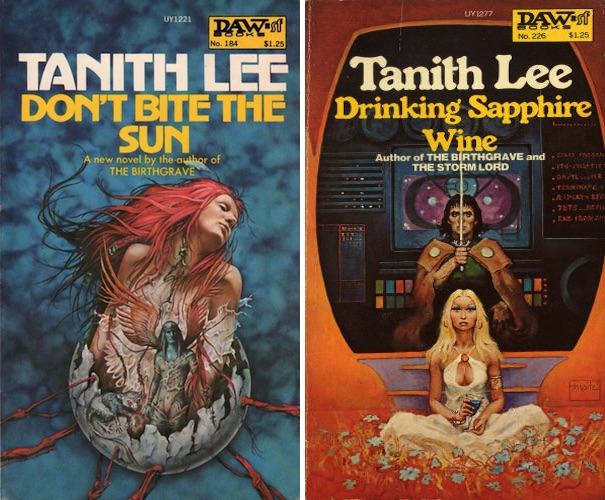
Tanith Lee’s classic duology Don’t Bite the Sun and Drinking Sapphire Wine is set on a desert world hostile to unprotected life. Not that this matters, because all of its human inhabitants live in one of three domed cities: Four BEE, Four BAA, and Four BOO. Within those cities, virtually every need and desire is met. Even death is only a momentary inconvenience before one is incarnated in a new designer body.
The nameless protagonist, offered material paradise, commits the unforgivable sin of realizing that while the options offered are pleasant, none of them are meaningful. That realization is the border between life in paradise and life in a cossetted hell. Unfortunately for our hero, the Powers That Be in the three cities are determined to maintain the status quo of their cozy societies, keeping them just as they are…which means crushing (by any means necessary) any pesky aspirations for personal fulfillment.
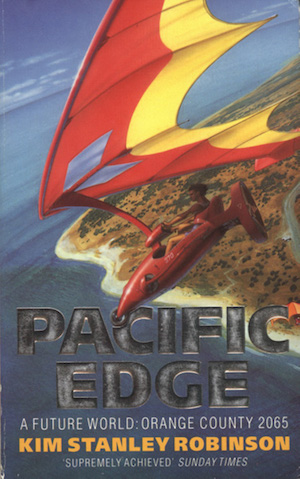
Pacific Edge is that rara avis, a Kim Stanley Robinson book about which I will make favourable comments. Set in a utopian world in which the excesses of capitalism and environmental degradation have been brought to heel, it’s a setting in which most people can expect to enjoy perfectly acceptable middle-class lives of placid ambitions and ecological moderation. Aside from people with burning desires to build strip malls or dark satanic mills, Pacific Edge’s world seems one where it would be easy to be happy.
Except, of course, if one is an essentially unlovable prig like the novel’s lead, Kevin Claiborne, whose steadfast adherence to the ethic that makes his world the quasi-utopia that it is does not make him one iota more desirable to Ramona, the woman with whom he is smitten. Convinced that he is in a romantic triangle, Kevin contends mightily against the man he sees as his rival. It’s a romance with a happy ending, although not for Kevin.
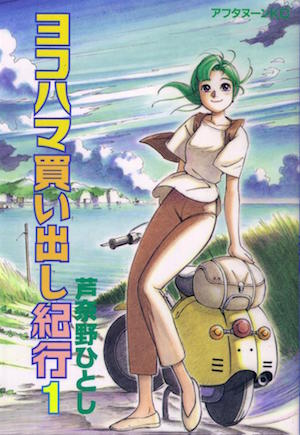
Hitoshi Ashinano’s Yokohama Kaidashi Kikō is set not long after the end. Events never fully explained led to rising sea levels and the inexorable decline of the human species. Despite this, the era in which protagonist Alpha lives seems to be a tranquil one, in which one day is much like another. It helps that Alpha is not a human, but rather one of the immortal androids who will inherit the Earth once we’re gone.
Nothing much happens in YKK, and what does, happens slowly. The series eschews drama for depictions of life’s quiet moments, moments of melancholy (for the humans, who to be honest do not seem all that bothered by their coming extinction), shared happiness, and (of course) lavish scenery porn. Which gets us to…
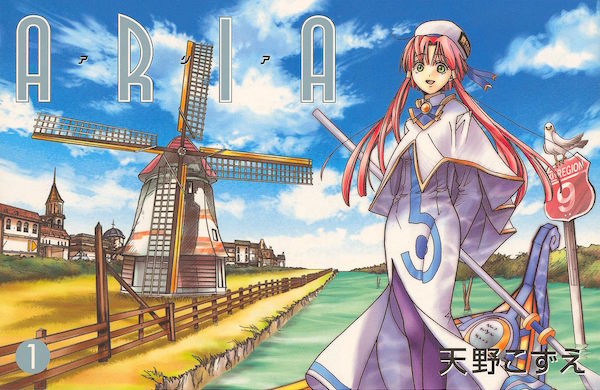
Amano Kozue’s Aria is set on 24th-century Mars. Implausibly effective terraforming has turned the dead world we know into an ocean-covered garden world now called Aqua, one across which energetic humans have sprinkled works of impressive civil engineering. One of its jewels is the city of Neo-Venezia, which is as close to a one-to-one scale model of Venice as its architects were able to create. It seems likely that the process of transforming Mars involved many dramatic moments, but all of that is in the past. Modern Aqua cares not for plot-enabling drama.
Instead, the manga follows Akari and her friends as they struggle to master the skills needed to join the upper ranks of Aqua’s Undines (or gondoliers). All that stands between the teenaged girls and the positions they desire is years of hard work. This slice of life futuristic tale is, like YKK, about the quiet moments in life, illustrated by lavish scenery porn: Come to Mars for the gondolas, stay for the exquisite submerged ruins.
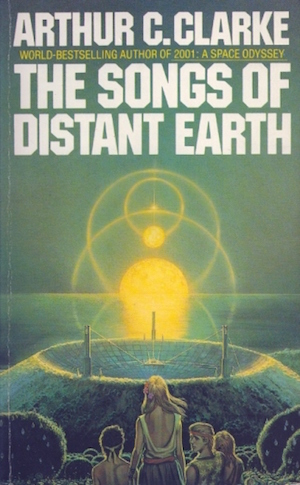
Terrestrial humanity is entirely extinct in Arthur C. Clarke’s The Songs of Distant Earth. No doubt awareness of the Sun’s impending nova provoked all manner of drama on Earth. For the people of the exoplanet Thalassa, settled centuries before by a sub-light seedship, the nova is barely a historical footnote. Ocean-covered Thalassa offers its island-dwelling population of decent, sensible people satisfactory small lives punctuated only by small-scale, non-threatening interesting events.
This tranquil existence is disrupted by the sudden arrival of Magellan, the last starship from now-expunged Earth. Forced by mishap to pause briefly at the backwater world, the crew of Magellan appeal to Thalassa to allow them to orbit and rebuild their debris shield from Thalassa’s abundant water. “Briefly” is still enough time for the Thalassan woman Mirissa to notice just how attractive strangers can be (in a world that’s normally entirely lacking in strangers). As the ensuing romance and its repercussions unspool, the Magellan’s crew must decide whether to continue to their intended destination or to stay at Thalassa.
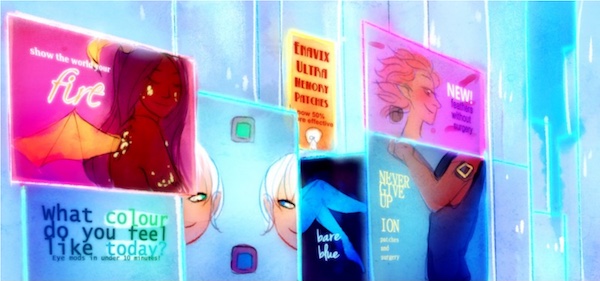
Mods (body modifications) grant the characters that populate walkingnorth’s webcomic Always Human nigh-perfect health and virtually any appearance they desire. These beautiful folks live in a peaceful world filled with ample opportunities for rewarding work. Mods and other high technology also facilitate humanity’s inexorable spread across the Solar System (even if the mods are not yet as powerful as John Varley’s null-suits, as featured in his Eight Worlds books).
When VR designer Sunati encounters university student Austen while riding the lavishly funded public transit, Sunati is intrigued by Austen’s bold decision to not use mods. In fact, Austen has a disability that prevents her from using mods; the excruciating conversation provoked by Sunati’s misapprehension is the meet-cute that kicks off the romance that forms the central plot line of the webtoon. Along the way, walkingnorth illustrates all the challenges that even people in quasi-utopian worlds will inevitably face, from crippling self-doubt to impossible work-life balance challenges. There are moments of gentle drama—true love does not always run smooth—but in the end, all is love and kisses.
All those are from recent reading. What about you?
In the words of Wikipedia editor TexasAndroid, prolific book reviewer and perennial Darwin Award nominee James Davis Nicoll is of “questionable notability.” His work has appeared in Publishers Weekly and Romantic Times as well as on his own websites, James Nicoll Reviews and Young People Read Old SFF (where he is assisted by editor Karen Lofstrom and web person Adrienne L. Travis). He is surprisingly flammable.










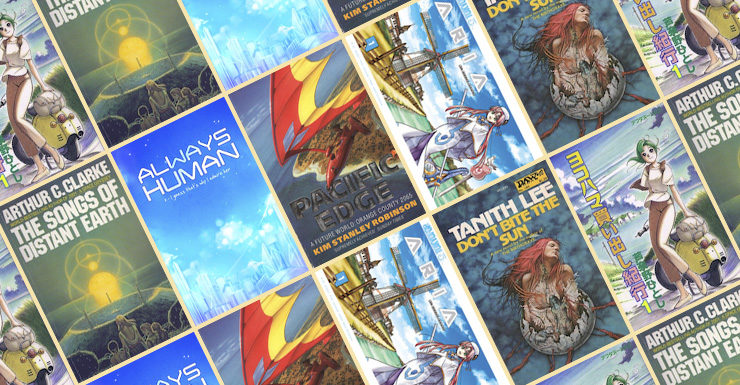
I think this is the first time more people have favourited something by me than commented on it…
I missed the most common method of plotting utopian books, which is to have someone new to the setting wander around asking leading questions. Examples abound. Otherwise, the trick is to come at the plot from an angle to which the utopian elements do not apply.
And now I’m thinking Building Harlequin’s Moon started when one of the authors read The Songs of Distant Earth and said to themselves “nope, not enough pointless cruelty”.
@1, Which is of course how the original ‘Utopia’ was written, and ‘News from Nowhere’ and all the rest. But those weren’t intended as stories but as social criticism.
Some more Clarke: Against the Fall Of Night/The City and the Stars. Lion of Comarre. And, arguably, Imperial Earth
I almost used Imperial Earth as an example.
It’s odd that the current conditions don’t seem to be inspiring a flurry of utopian novels suggesting other ways of living, or perhaps it’s just that I am missing them. Or maybe people are happy with rule by deranged plutocrats. My Tiptree Award reread stalled but even a few books in it was interesting to notice how common it was in the early 1990s to feature other political-economic arrangement but these days not so much (aside from feudalism.).
“Slice of Life” is a popular genre in Japanese manga/anime, which has never really caught on here in The West (the nearest analogy I can come up with is a sitcom with no forced humour, or a serial drama without the drama). Aria and YKK are among the rare sci-fi-set examples –most of the examples I’m familiar with tend toward modern-day settings (usually involving teenagers, though there’ve been a couple of decent josei/seinen recently).
SoL is based largely around building characters and relationships as opposed to dramatic conflict, which often has the side-effect of making the setting look pretty utopian (at the very least, all major problems are either ignored or handled off-camera –which is one of the advantages of a high school setting, as all the characters are supported by their parents and have set daily schedules).
Some good vaguely-genre examples of Slice-of-Life manga are Hakumei & Mikochi (a pair of tiny faeries live an idyllic life in the woods surrounded by talking animals, where the greatest danger is mild discomfort or social humiliation), Flying Witch (about a young witch who moves to a sleepy country community and makes new friends. The only real drama involves other peoples’ expectations of what a witch is like versus the less-glamourous reality), and Saint Young Men (about Buddha & Jesus sharing an apartment in Tokyo. The most terrible thing they encounter is Buddha getting stuck in line behind That Old Lady who pays for everything with 1-yen coins).
… This is where I suddenly realize I’ve never written a utopian setting—to do so I first have to arm-wrestle Satan my inner cynic into submission.
BRB in a couple of years, folks.
(Of course there’s the Stephen Pinker-esque position that pretty much any developed world resident in the 21st century is living in a utopian post-scarcity society unimaginable as recently as 1800. (Even homeless people: the dumpsters are overthrowing with barely time-expired food! People throw out used clothes before they’re reduced to unwearable rags! Cardboard boxes exist and are free for the sleeping upon! And so on.) By this yardstick, even 1984 is a utopia. But I digress …)
James, apropos #5:
I, for one, want a list of things we are not currently seeing in SF—starting with novels set in the brave new 22nd century, and utopian/post scarcity societies, but there’ve got to be more missing tropes trapped in our collective blind spot.
It might be interesting to smush them all together and write a novel that syncretizes everything missing from today’s SF. (But first I need to complete other projects.)
@1/James Davis Nicoll: I like the reverse – stories about characters from an utopian society who venture outside and show surprise or outrage or have to find a way to deal with the things they find there. Some of my favourite examples are from Ursula Le Guin’s Ekumen stories, with e.g. Hain or O as utopian societies and e.g. Werel/Yeowe as non-utopian ones. Much of Star Trek is like that too.
@5/James Davis Nicoll: I will never understand the allure of feudalism. Is it because oppression is more personal in a feudalistic society, or is it that people imagine themselves as royalty and not as peasants?
I wonder if it was the cold war with its ideological competition that inspired writers to come up with new and different kinds of political-economic arrangements in the early 1990s.
The set of utopian and quasi-utopian novels not set in pocket nations that got there without marching over mass graves is even smaller than the set of utopian novels post 1980.
Well, once the SU folded its tents, there were those who felt the One True Social Economic System had triumphed and there was no need to consider alternatives.
“Futurama” has… electronically calculated optimal job satisfaction, people tubes, a terrifying Robot Santa Claus, weekly alien invasions, suicide cabinets deceptively similar to phone booths if you need a phone, and President Nixon. But still… wonderful.
I haven’t seen the latest Star Trek, but up to now it’s been utopey in the background, except when aliens or overexcited Starfleet captains attack or you get accidentally brought to the Delta Quadrant. Which all happen a lot, admittedly.
SU, Soviet Union? Capitalism is like Democracy, it seems like the worst possible economic system – until you look over the alternatives.
Lots of slice of life fanfic, too, at least of manga/anime properties. There are also a lot of sports manga that probably aren’t slice of life but are similarly “life is good, we have drama without life-threatening or even romance-threatening stakes.”
Bit surprised the Culture wasn’t mentioned; of course it mostly takes the tack of setting stories outside the Culture, or else using an outsider tourist (Look to Windward). Ken MacLeod’s Fall Revolution series features societies with tech levels many would call Utopian, though also with concerns about mad transhumans, which I guess pull down Charlie’s Singularity Sky, Accelerando, and Glasshouse (and of course the robot novels build dystopia out of immortal robots.) I think MacLeod’s Learning the World is slice of utopia, at least for the human colonists; I forget about the alien space bats.
How about Cory Doctorow’s Walkaway? Walkaway culture is pretty utopian (although they spend large chunks of the book in violent conflict with Default).
Do utopian settings have to be post-scarcety? In the seventies, there were quite a few novels about utopian societies set on poor and hostile worlds. The most famous example is probably Ursula K. Le Guin’s The Dispossessed, but I also have fond memories of Joan D. Vinge’s The Outcasts of Heaven Belt. It’s an example of the kind of story I mentioned in comment #9 – a spaceship crew from the poor, but utopian planet Morningside visits the formerly rich Heaven system and encounters extreme poverty and piracy, a socialist dictatorship, and a crazy direct media democracy (or is that “media direct democracy”?) run by constant plebiscites and demagogues.
@13/Roxana: “Capitalism is like Democracy, it seems like the worst possible economic system – until you look over the alternatives.”
On the other hand, there are so many alternatives inside capitalism and democracy, and it’s much harder to say which of these is best. Parliamentary or presidential system? Plurality voting or proportional representation? Raw or welfare capitalism? Not to mention all the political and economic systems that haven’t been invented yet… it’s nice to see some of them in science fiction.
Other uptopian sf manga that I think fit this are Saturn Apartments, Scientia, and maybe Humanity has Declined, which is actually an anime adaptation of a novel, though a confusing one.
@@.-@ I always thought of Clarke’s Against the Fall of Night as a dystopia. Death by ennui seems a terrible fate for mankind.
An interesting question, about utopias and post-scarcity. I would say definitely not, in the strict sense of post-scarcity, but I think it usually needs to be beyond a hardscrabble struggle for existence; lifeboat ethics should not apply.
Then again, IIRC The Dispossessed was about a society “utopian” in its commitment to equality, but with a rather marginal existence… hunter-gatherer societies are sort of like that too; can’t have inequality if one can’t accumulate enough to be unequal.
Bujold has called Beta Colony a techno-utopia (maybe techno-socialist utopia?) despite being rather mercantile and having various flaws. But they try to give everyone a fair start in life, you can get food rations if unemployed and Job Centers will try to make you employed, Cordelia decides her idea of poverty is Barrayar’s idea of lower middle class — no one is going hungry or unsheltered or without the equivalent of Internet access. And by implication they vote a whole lots; as it was settled by liberal Americans, I assume they instituted initiatives and referenda a la many states, with Swiss-level or greater frequency.
Nanoha’s Time-Space Administration Bureau is vague, possibly not democratic, and has a tendency to dubious secret research projects, but also a very enlightened attitude to prisoners and rehabilitation. I like to think of it as a full employment ‘utopia’ with a penal system that would shame Norway or Switzerland. Though they’re also much friendlier to child labor and child soldiers.. I posit they would argue our society horribly infantilizes teenagers, failing to give them gradually increasing responsibility and exposure to adult roles.
Eric Frank Russell’s 1940s novella “And Then There Were None” is set on a Utopian colony planet with a sort of small-town Anarchist system, where people informally track their “obs” (obligations) instead of using money. The drama comes from the arrival of a warship from the militaristic galactic empire that’s rediscovered this backwater after centuries, and how the peaceful natives thoroughly subvert the military’s attempt to reabsorb them. It’s really a masterpiece of social satire. (And now that I think about it, it’s the exact inverse of many of Iain M Banks’ Culture novels, where it’s the empire that’s Utopian communist.
Neal Asher’s Polity is a Utopia, but one enforced by an oligarchy. Conflict arises from inside when some oppose the oligarchy, largely for bigoted reasons, or from the outside for the usual reasons.
When the present is perceived as challenging/dangerous/corrupt/non-prosperous, we get dystopia novels, not hopeful utopia stories. E.g. S.F. in the 70s. The 90s seemed very prosperous, so we got more Utopian or hopeful literature. Sure, we also got cyberpunk, but at heart, most of it was pretty upbeat, even if the setting was gritty. We’re in a period when folks finally realize that the SOL is half that of their parents’ and the SC delivered the nation’s polity into the hands of oligarchs. It’s time for dystopias in literature again.
Personally, I prefer hopeful stories that portray a bright, prosperous future — which really wouldn’t be that hard to achieve in reality, if some very real forces weren’t running a well organized and often very subtle propaganda campaign to prevent it. “Charitable” lobbying organizaations are not required to disclose their donors. So there is nothing to prevent them from accepting money and marching orders from for-profit interests and acting as public policy/propaganda mercenaries. Usually, these donations are first laundered through a “charitable foundation” loosely tied with the contributing/ordering organization.
I think Norman Spinrad deserves a mention here. A World Between (1979) is about a nice hippie planet that gets caught up in an interstellar conflict between opposed groups of ideologues, but manages to defeat them by just being cooler than them. His Voidships duology (The Void Captain’s Tale 1983, Child of Fortune 1985) is set in a decadent interstellar society of plenty. Misery is snatched from the jaws of happiness by virtue of pesky human passions.
I’m not sure whether Tanith Lee’s duology counts as an utopia, it looks more like the dystopia sister trope “apparent utopia turns out to be a dystopia after all”.
Which is an interesting genre by itself, now that I think about it. I guess it comes from decades of conflicting propaganda and anti-propaganda about communism/capitalism. (“It’s perfect!” “No, it’s secretly terrible!”)
No love for Logan’s Run?
I think a great exploration of tension in a utopia is The Wheel of Time’s downfall of the Age of Legends…in AMoL, Rand gives a great example of how utopia often are blind to festering problems that end up have catastrophic consequences.
@20/mooseyard: I read that story decades ago, but I had forgotten the author’s name. Thanks for bringing it up!
@24/Kartikeya GS: “No love for Logan’s Run?”
As an example for a utopian setting? Do you think it would be a good idea to kill everyone over twenty?
“[…] in AMoL, Rand gives a great example of how utopia often are blind to festering problems that end up have catastrophic consequences.”
A utopia that ends in a catastrophe seems like an oxymoron to me. Do you mean self-proclaimed utopias? And what’s “AMoL”?
AMoL = A Memory of Light, the last book of the Wheel of Time series.
@26/birgit: Thank you! Now I also know who “Rand” is – I thought it was a country :)
@24,
I would call Logan’s Run a dystopia pretending to be Utopian.
Ian Bank’s Culture stories – the culture is a utopia, but one with responsibilities….
IMO almost all ”Utopias’ are actually dystopias. There always seems to be a very high level of regimentation and conformity, at least in the philosophic constructs I’m most familiar with, like the original Utopia, HG Wells’ version, etc.
@30/Roxana: I once heard a talk about the history of utopias, which distinguished between “order utopias” and “freedom utopias”. All the famous old ones, e.g. Plato or More, are “order utopias”, and they tend to look dystopian to us.
Plato’s Republic is a bloody nightmare!
In older times Order was the ideal, life being distinctly more precarious back then.